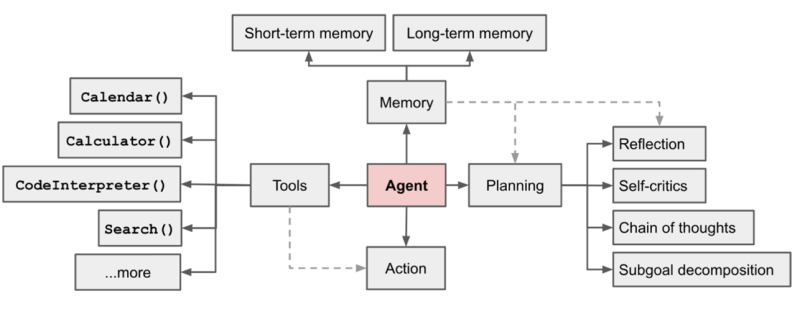Discover how intelligent agents are transforming the use of large language models (LLMs) in various industries. While LLMs serve as vast knowledge sources, they have limitations in reasoning and real-time data access. Intelligent agents help overcome these challenges by providing tools, memory, and reasoning capabilities, making them adept at handling complex tasks. For example, in workflow management, multiple agents can collaborate to streamline processes like loan application verification. Although fully autonomous systems are still a future goal, these multi-agent approaches enhance efficiency and reduce human effort. As the field evolves, agents are set to play a crucial role in advancing artificial intelligence towards greater capabilities.
The Rise of AI Agents: Bridging the Gap to Advanced Intelligence
In the ever-evolving world of artificial intelligence (AI), large language models (LLMs) like ChatGPT have captured significant attention for their ability to generate human-like text. However, these models still face limitations, keeping the dream of artificial general intelligence (AGI) at bay.
LLMs have become popular because they store vast amounts of knowledge from the internet and demonstrate new skills as they evolve. Despite this, they struggle with up-to-date information and reasoning, making them less reliable than we may hope. As AI expert Yann LeCun points out, their auto-regressive nature can lead to inaccuracies.
Fortunately, intelligent agents have emerged as a solution to these problems. Think of agents as powerful tools that enhance LLM capabilities. An agent can gather real-time information, improve reasoning, and perform tasks independently. They are made up of various components like tools for data access, different types of memory for information storage, and a reasoning engine that breaks down complex tasks.
Agents shine when tackling intricate tasks. For example, in a writing project, one agent can conduct research while another drafts the text, working together to achieve a common goal. This collaborative approach reduces the chances of mistakes, known in AI as “hallucinations,” by clearly defining roles and tasks.
The concept of using multiple agents instead of just one opens up new possibilities. In a multi-agent system, each agent can specialize in different aspects of a task, like understanding documents or retrieving information, improving overall performance and efficiency.
However, bringing this technology into real-world use is not without challenges. Managing many agents can be complex, and ensuring they work together effectively requires advanced strategies. Issues like processing speed and accuracy also arise, but solutions are being developed to enhance agent performance.
Looking ahead, experts like Andrew Ng emphasize that agents will play a crucial role in the future of AI. As technology progresses, these systems will tackle more complex tasks across various formats like text, images, and audio. While true AGI remains a distant goal, intelligent agents are key to closing the gap between current LLMs and a future where machines can think like humans.
For those who want to stay updated with the latest in AI, consider joining a newsletter that covers these innovations.
If you would like to read more about cutting-edge ideas and share insights in the AI field, check out data communities and platforms where experts exchange knowledge about the latest trends and technologies in data and AI.
Tags: AI, Agents, LLMs, ChatGPT, Artificial Intelligence, AGI, Technology Trends, Machine Learning
What is multi-agent AI?
Multi-agent AI is a system where multiple AI programs, or agents, work together to solve problems or complete tasks. Each agent has its own role and can share information to be more effective.
How does multi-agent AI handle complex situations?
Multi-agent AI can handle complex situations by dividing tasks among different agents. Each agent can focus on a specific part of the problem, making it easier to find solutions.
What can multi-agent AI do that LLMs struggle with?
Multi-agent AI can better manage tasks that require teamwork, real-time decision-making, and adapting to changing environments. LLMs may struggle with these because they work as single models without collaboration.
Can multi-agent AI learn from each other?
Yes, multi-agent AI systems can learn from each other by sharing experiences and strategies. This teamwork helps improve overall performance and decision-making.
Is multi-agent AI better than LLMs for all tasks?
Not necessarily. Multi-agent AI is better for tasks requiring collaboration and real-time responses, while LLMs are great for language-based tasks and generating text. The best choice depends on the specific task.






